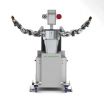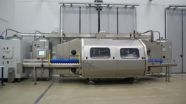Imagine your future self: Will it help you save money?
2010-12-23
(Press-News.org) Why do people choose present consumption over their long-term financial interests? A new study in the Journal of Consumer Research finds that consumers have trouble feeling connected to their future selves.
"This willingness to forego money now and wait for future benefits is strongly affected by how connected we feel to our future self, who will ultimately benefit from the resources we save," write authors Daniel M. Bartels (Columbia Business School) and Oleg Urminsky (University of Chicago).
When we think of saving money for the future, the person we think of can seem different from the person we are now, the authors explain. People have trouble sacrificing in the present for that stranger in the future.
In one study, the researchers had graduating seniors read one of two narratives: the first indicated that their self-identity was already fully formed and would not change after graduation. The other passage indicated that graduation would change their self-identities. "When seniors were told that graduation would lead to major changes in identity, they reported feeling less connected to their future selves," the authors write. "Those thinking about changes in identity were also more impatient, choosing less-valuable gift certificates that would be available sooner over higher-valued gift certificates that required waiting a year."
In a subsequent study, the authors asked people to evaluate their sense of connectedness and similarity to their future selves. Three weeks later, they were asked them to choose between smaller gift cards they could use right away or larger gift cards that would require waiting. "Those who had felt more connected to their future selves then made more patient choices and were more willing to wait for a higher-valued gift card," the authors write.
When people fail to save for the future, they may not be making a mistake or failing to exercise self-discipline; they don't fully recognize benefits that their future selves will receive. "Countering this tendency, by helping people recognize the enduring aspects of their personal identity, may hold the key to making people more patient and more willing to sacrifice, save, and invest for the future," the authors conclude.
###
Daniel M. Bartels and Oleg Urminsky. "On Intertemporal Selfishness: How the Perceived Instability of Identity Underlies Impatient Consumption." Journal of Consumer Research: August 2011. Further information: http://ejcr.org.
END
ELSE PRESS RELEASES FROM THIS DATE:
2010-12-23
Although it is the third most frequent cause of death in Germany, blood poisoning is frequently underestimated. In this country, 60,000 persons die every year from some form of sepsis, almost as many as from heart attacks. The Sepsis Nexus of Expertise states that patients arriving at the intensive care ward with blood poisoning only have a 50% chance of surviving. One of the reasons for the high mortality rate is the fact that patients are not correctly treated due to late diagnosis. The doctor and the patient used to have to wait as much as 48 hours for the laboratory ...
2010-12-23
People who feel powerful are more likely to believe they can beat cancer if it's described in human terms, according to new study in the Journal of Consumer Research.
The study looks at anthropomorphism, or the tendency to attribute humanlike characteristics, intentions, and behavior to nonhuman objects. "The present research shows important downstream consequences of anthropomorphism that go beyond simple liking of products with humanlike physical features," write authors Sara Kim and Ann L. McGill (both University of Chicago).
Previous consumer research has already ...
2010-12-23
People are happier when goods are more equally distributed, but equality makes people want to spend more to get ahead of their neighbors, according to a new study in the Journal of Consumer Research.
Authors Nailya Ordabayeva (Erasmus University, The Netherlands) and Pierre Chandon (INSEAD, France) examined the way equality influences the consumption decisions of people in the bottom tiers of social groups. The researchers found that increasing equality decreases bottom-tier consumer envy of what other people have and boosts their satisfaction with their possessions. ...
2010-12-23
The way people treat their possessions looks like love, according to a new study in the Journal of Consumer Research.
"Is it possible for consumers to be in love with their possessions?" ask authors John L. Lastovicka (Arizona State University) and Nancy J. Sirianni (Texas Christian University). When it comes to cars, computers, bicycles, and firearms, the answer seems to be a resounding yes.
The researchers visited five car shows in Arizona and conducted in-depth interviews with car enthusiasts (males and females, aged 19-68). They found that love-smitten consumers ...
2010-12-23
Adventure seekers are plunking down more than $50,000 to climb Mount Everest, but a new study in the Journal of Consumer Research finds that people who pay for transformative experiences often lack the communitarian spirit that usually defines such activities.
"In order to escape the rules, contraptions, and stresses of daily life in the city, many people search for new and liberating experiences that transcend their normal bureaucratic and corporate existence," write authors Gülnur Tumbat (San Francisco State University) and Russell W. Belk (York University). However, ...
2010-12-23
If a vegetarian has to buy a steakhouse gift certificate for a friend, her discomfort will lead her to buy something else that reaffirms her identity, according to a new study in the Journal of Consumer Research.
"When gift givers choose a gift that matches the identity of the recipient but is contrary to their own identity, they experience discomfort," write authors Morgan K. Ward (Southern Methodist University) and Susan M. Broniarczyk (University of Texas). This discomfort leads consumers to choose other products that express their identities.
The authors investigated ...
2010-12-23
Picture the following: With great care, a robot picks up a gear wheel in one hand, a housing in the other, and places the two together. When they don't immediately engage, it breaks off its movement. Slowly, it twists the gear wheel round a little and tries again. This time the wheel slots easily into its mounting. The robot smiles, and places the correctly assembled part on the conveyor belt. The pi4-workerbot is capable of making many more movements than a normal robot and is the jewel in the crown of the EU-funded PISA research project, which aims to introduce greater ...
2010-12-23
WASHINGTON, Dec. 22, 2010 — Just in time for New Year's Eve, and the arrival of the International Year of Chemistry, a study may settle that long-standing disagreement over the best way to pour a glass of champagne: Scientists in France are reporting that pouring bubbly in an angled, down-the-side way is best for preserving its taste and fizz.
The study also reports the first scientific evidence confirming the importance of chilling champagne before serving to enhance its taste. They reported in the American Chemical Society's Journal of Agricultural and Food Chemistry. ...
2010-12-23
The AZTI-Tecnalia technological centre, in a project undertaken by the Tecnolat and Llet de Catalunya dairy product companies within the FUTURAL project, has verified that, as an alternative to the traditional heat treatment for decontamination of a number of dairy products, high pressure technology is highly recommendable. In fact, according to a press release from Tecnolat, the results, especially with ready-to-eat fruit products and in the inactivation of moulds and yeasts in other dairy products, "were highly positive and promising".
The research and trials carried ...
2010-12-23
FINDINGS: By determining how corticosteroids act to increase production of red blood cell progenitors, Whitehead Institute researchers have identified a class of drugs that may be beneficial in treating some erythropoietin-resistant anemias. One such anemia is Diamond-Blackfan anemia (DBA), which is frequently treated with corticosteroids, despite their severe side-effects. The identified class of drugs may be able to treat other anemias, including those resulting from trauma, sepsis, malaria, kidney dialysis, and chemotherapy.
RELEVANCE: Some common anemias can be treated ...
LAST 30 PRESS RELEASES:
[Press-News.org] Imagine your future self: Will it help you save money?


